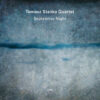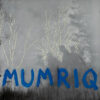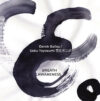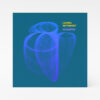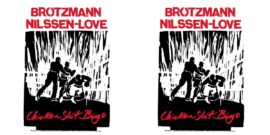
Terrie Ex (aka Terrie Hessels) came across Kurdish music in 1984 when his band The Ex collaborated with the Iraqi Kurdish band Awara and released the 7’’ single («Enough is Enough»/«Love», Ex, 1984). This meeting led Ex and his bandmates to learn more about the plight of the Kurdish people, their history, culture, music, hospitality, and food. Six years later, Andy Moor, a few years before he joined The Ex, took Ex to a performance of Kurdish singer-poet Şivan Perwer, where Ex found cassettes of another singer-songwriter-poet-actor-painter-activist, Arnhem-based Brader Mûsikî, who was born in 1958 in the Turkish part of Northern Kurdistan.
Soon Mûsikî began to perform with The Ex and both released a 7’’ single («6.2: Millîtan and Cemê Rynê», Ex, 1991). Jumping 25 years later to 2018, Ex and Mûsikî met again and Mûsikî joined The Ex 40th anniversary performances. Afterward, Ex and Mûsikî planned to release a new album of Mûsikî made of his home recordings, but as a kind of retrospective of his busy career. As all of the Terp Records albums, «Herim Kuda» is a work of love. Ex and partner Emma Fischer chose many stories and photos covering the life of Mûsikî, translated the songs, and added more stories about the background of the music and a comprehensive discography. Another The Ex bandmate, singer-guitarist Arnold de Boer did the mastering.
Ex asks in his liner notes how come so few people know about Mûsikî or the never-ending plight of the Kurdish people, betrayed by the superpowers but still standing up against cruel injustice, giving hope and strength to the unique Kurdish culture and music. You are guaranteed to ask yourself the same question. The warm voice of Mûsikî, his powerful yet innocent conviction, will take you by force, instantly and already in the first song, «Şeva Hîcran» (Night of Farewell), an adaptation of a poetic song by the most loved Cegerxwîn (1903-1984). The second song, «Termên Windayî» (Missing Bodies) about the murdered Kurdish leaders, with its hypnotic, irresistible chorus, may give you a glimpse into the uncompromising spirit of the Kurdish people, captured so beautifully by Mûsikî.
The following songs offer a rich spectrum of Mûsikî’s art. The title song, «Where Should I Go?», a traditional love song, stresses that Mûsikî is not only a great singer but also a great player of the traditional Kurdish stringed instrument, tembûr. Mûsikî delivers the poetic, eventful and miserable love story of the poet Melayê Cizîrî (1570-1640), «Dilbera Zêrîn Kemer» (Sweetheart with the Golden Belt), as a wise, insightful wise man. «Ez Mame Di Hikmeta Xwedêde» (I am in the Government of ‘God’ (Cry of Distress)), is based on a poem by Ahmedê Xanî (1650-1707), author of the Kurdish epic «Mem û Zin», and its mourning tone relates to the continuing tragedy of the Kurds, abandoned even by the gods. Mûsikî’s «Kalbûn Belaye» (At Age) tells about himself, becoming older «and paler.. like nature at the start of autumn». Mûsikî concludes this emotional album with a lighter note and three love songs – the traditional «Lowiko Nobedaro» (Watchman), the upbeat «Evînkuj» (Fatal Love) to the words of journalist-poet Xelef Zebarî (1948-2018) who compares the beauty of the beloved one to the beauty of nature in Kurdistan, and «Darhejîrokê» (She, The Fig Tree), another traditional song from the Mêrdîn province, the place where Mûsikî was born.
Listen to Brader Mûsikî. He is made of the right, most potent stuff.
Eyal Hareuveni
Brader Mûsikî (v, tembûr, def), Simko Terkî (def, oud, vio), Memo (darbuka); Nalin (v); Jiyan (v)


